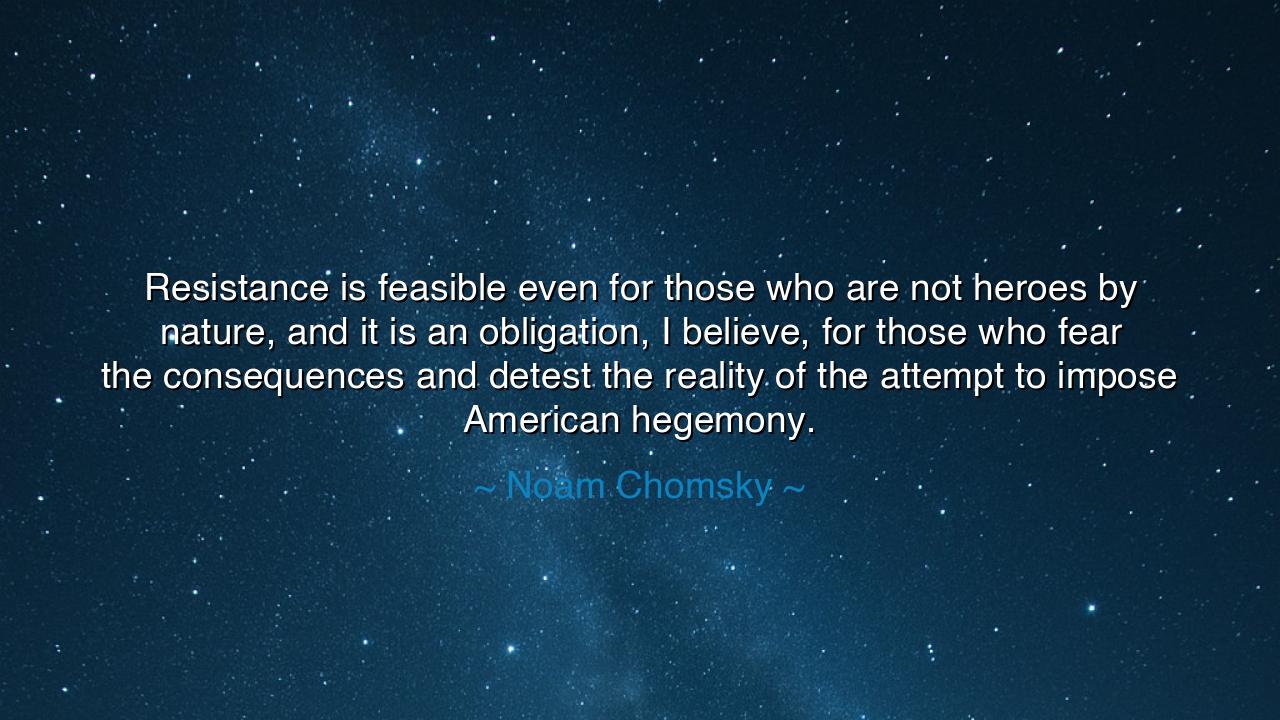
Resistance is feasible even for those who are not heroes by
Resistance is feasible even for those who are not heroes by nature, and it is an obligation, I believe, for those who fear the consequences and detest the reality of the attempt to impose American hegemony.






“Resistance is feasible even for those who are not heroes by nature, and it is an obligation, I believe, for those who fear the consequences and detest the reality of the attempt to impose American hegemony.” Thus declared Noam Chomsky, the scholar and critic, who for decades has spoken against the tides of empire and the silent chains of domination. His words ring with the gravity of the ancients, reminding us that courage is not reserved only for the mighty or the lion-hearted. Even those who tremble, even those who shrink from danger, are called to resist when the forces of injustice and hegemony seek to subdue the earth.
The meaning of this statement is layered with both hope and burden. Chomsky tells us that resistance is feasible—that it is possible, even for the ordinary, the fearful, the hesitant. One need not be a born warrior or a saintly martyr to oppose oppression. Resistance can take many forms: the quiet refusal to accept lies, the steadfast holding to truth, the small acts of solidarity that together form a shield against tyranny. It is within reach of all, not merely the celebrated few.
But he goes further, declaring that resistance is also an obligation. If one sees the dangers of imperial power—if one recognizes the cruelty of wars, the silencing of weaker nations, the trampling of dignity—then to remain silent is itself a betrayal. To detest the reality of domination, yet to do nothing, is to surrender the soul. Thus, Chomsky calls upon each conscience: it is not enough to feel dismay, one must act, however small the act, against the tide of hegemony.
History provides luminous examples. Consider the story of the White Rose, the student group in Nazi Germany. They were not generals, not seasoned heroes. They were young men and women, trembling under the gaze of a ruthless state. Yet they resisted with pamphlets and words, declaring truth into the darkness. They knew the consequences, they feared them deeply, yet they chose to act. Their courage was not born of fearlessness, but of duty. And though they fell, their voices rose beyond death, echoing the very truth that Chomsky proclaims: resistance is the obligation of all who see injustice.
The origin of Chomsky’s words lies in his long opposition to the wars and policies of American power, particularly the attempt to extend dominance across the globe under the banner of freedom. He witnessed how nations were bent, how voices were silenced, how resources were seized—all in the name of hegemony. His cry is not one of hatred, but of vigilance: he warns that empires rise not only by the will of rulers but by the submission of the ruled. To resist, then, is to reclaim the dignity of the common person, to declare that conscience will not be bought nor silenced.
There is, too, a heroic humility in this teaching. For Chomsky does not tell us to aspire to greatness beyond our strength. He does not say all must be martyrs or leaders. He says simply: resistance is feasible, even for you, even for me. One voice raised in dissent, one act of refusal, one truth spoken aloud can ripple outward, joining others until the tide turns. In this way, the fearful are transformed into the courageous, not by nature, but by necessity.
The lesson is clear: do not wait to feel like a hero before you resist injustice. Do not say, “I am too small, too weak, too ordinary.” For the act of resistance is not reserved for the mighty. It is the duty of all who see and who care. Begin where you are. Speak truth where lies are spoken. Refuse complicity where cruelty is normalized. Support those who are crushed beneath the weight of empire. In these acts, great or small, you fulfill the obligation Chomsky speaks of.
Therefore, dear listener, let these words be carved into your heart: resistance is both possible and required. You need not be fearless to stand against hegemony. You need only be willing. For history belongs not only to the great conquerors, but to the countless unnamed who, trembling, resisted—and in their resistance, preserved the soul of humanity.






AAdministratorAdministrator
Welcome, honored guests. Please leave a comment, we will respond soon